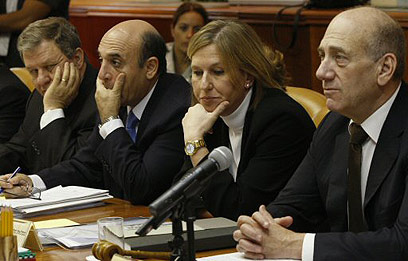
Ramon offers NIS 1.1 million to each settler willing to leave home
Cabinet debates evacuation-compensation bill as vice premier suggests settlers ready to leave area east of security fence be eligible for substantial restitution, offers those willing to relocate to Negev, Galilee increased restitution
Settlers who will agree to voluntarily leave their West Bank homes, east of the separation fence, will be eligible for NIS 1.1 million (about $305,640) each in compensation funds, Vice Premier Haim Ramon said Sunday.
Ramon, who outlined the monetary plan during the cabinet's meeting on the controversial evacuation-compensation bill, went on to tell the ministers that settlers who would agree to be relocated to the Negev will be eligible for a financial settlement 25% higher, and those willing to relocate to the Galilee area will get an additional 15% in restitution funds.
According to the data he presented the cabinet with, some 18% of settlers – roughly 11,363 people – are willing to vacate their homes immediately.
"Vacating the residents of Judea and Samaria is an inevitable step, considered by anyone who believes in the two-state solution, which is the majority of the Israeli public," said Ramon.
"A government statement cementing the notion that Israel has no intention of ruling over territories east of the fence would help Israel's stand in the negotiations with the Palestinians, as well as its standing with the international community.
"This plan," added the vice premier, "could also help us strengthen the settlement blocs west of the fence, leaving those part of Judea and Samaria under Israeli sovereignty."
Curbing future problems
As for the fierce opposition the evacuation-compensation bill has encountered within the cabinet, as well as within the right-wing parties, Ramon said that "we cannot see any interim agreement (with the Palestinians) in the near future.
"The biggest threat Israel faces now is the growing perception, among both the moderate forces in the Palestinian society and within the international community, that we have to start exploring a one state-for two people solution. Pushing the evacuation-compensation bill through would help us curb this dangerous idea."
The implementation of the evacuation-compensation bill, added Ramon, should not prove to be overly complicated: "Most of the settlers have fought to live west of the fence. They know that at the end of the day, after the various governments have worked out the fence's outline and once a final agreement is signed, that (the west) is what will be left under Israeli sovereignty.
"Anyone saying we have to wait until an actual agreement is signed is essentially talking about halting everything. This is not what this government wants."
Following the cabinet meeting Ramon explained to reporters that the motivation behind promoting the evacuation compensation bill was to preserve Israel's Jewish and democratic identity.
"Everything east of the security fence will not be under Israeli sovereignty," he said. "We can control the (Jordan) Valley from a security sense, but we're talking about sovereignty."
As for the evacuation-compensation bill, Ramon said he intends on bringing it before the cabinet again "in a matter of weeks."
Prime Minister Ehud Olmert noted during the meeting that he too is concerned by the growing wish to look at the one state-for two people solution, as a possible answer to the Israeli-Palestinian conflict.
"I agree with Ramon that this growing trend is dangerous, since it's being explored not only by the Palestinians, but by the international community and some elements in the US as well."
Minister Amy Ayalon, who is one of the evacuation-compensation bill's greatest supporters, added that "the subject of the evacuation-compensation initiative is one of this government's biggest misses. The bill should have been pushed through and implemented immediately after the Gaza pullout was completed."
'Bill a colossal mistake'
Kadima chairmanship hopefuls, Foreign Minister Tzipi Livni, Transportation Minister Shaul Mofaz and Internal Security Minister Avi Dichter, were adamant against pushing ahead with the evacuation-compensation bill.
"We shouldn’t make any decisions today," said Livni. "Forethought is all good and well, but this is no time to make any decisions." The government must the inhabiting of the Negev and Galilee areas, she added, but pushing the evacuation-compensation bill may harm Israel's ability to define the future border.

Olmert, Livni, Mofaz and Sheetrit at cabinet meeting (Photo: AFP)
Mofaz, on his part, demanded the evacuation-compensation bill be taken of the cabinet's agenda: "Discussing the bill at a time in which we have no outlines for a (final) agreement would only harm the peace process and prompt the Palestinians to make more demands."
"This discussion is wrong," reiterated Dichter. "The timing is wrong and the essence of it is wrong. Indulging in this kind of debate is essentially putting the cart before the horses... Eventually it would only weaken Israel's stand."
Deputy Prime Minister and Industry, Trade and Labor Minister Eli Yishai added that "anyone pushing for the evacuation and compensation of settlers, may eventually push for the same to be done in Jerusalem, and for the erasure of the Jewish identity altogether. This bill is a colossal strategic mistake, which makes Israel out to be devoid of all principles."















